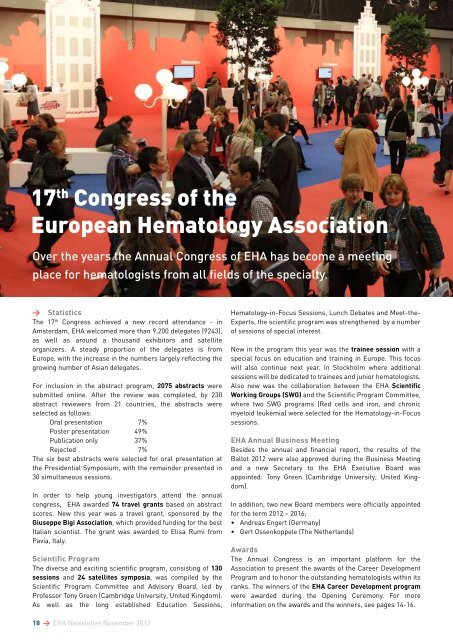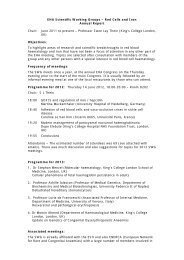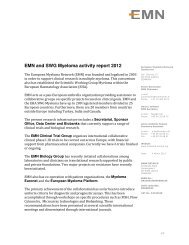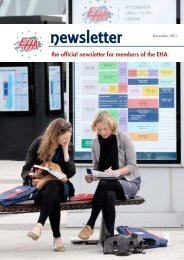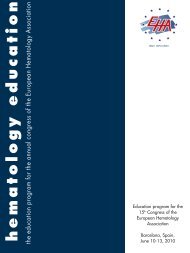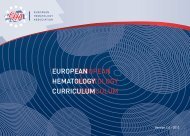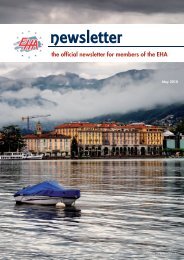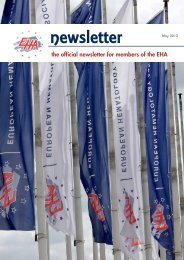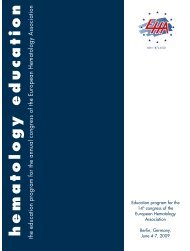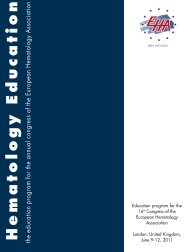Newsletter May 2012 - European Hematology Association
Newsletter May 2012 - European Hematology Association
Newsletter May 2012 - European Hematology Association
Create successful ePaper yourself
Turn your PDF publications into a flip-book with our unique Google optimized e-Paper software.
17 th Congress of the<br />
<strong>European</strong> <strong>Hematology</strong> <strong>Association</strong><br />
Over the years the Annual Congress of EHA has become a meeting<br />
place for hema to logists from all fields of the specialty.<br />
> Statistics<br />
The 17 th Congress achieved a new record attendance - in<br />
Amsterdam, EHA welcomed more than 9,200 delegates (9243),<br />
as well as around a thousand exhibitors and satellite<br />
organizers. A steady proportion of the delegates is from<br />
Europe, with the increase in the numbers largely reflecting the<br />
growing number of Asian delegates.<br />
For inclusion in the abstract program, 2075 abstracts were<br />
submitted online. After the review was completed, by 230<br />
abstract reviewers from 21 countries, the abstracts were<br />
selected as follows:<br />
Oral presentation 7%<br />
Poster presentation 49%<br />
Publication only 37%<br />
Rejected 7%<br />
The six best abstracts were selected for oral presentation at<br />
the Presidential Symposium, with the remainder presented in<br />
30 simultaneous sessions.<br />
In order to help young investigators attend the annual<br />
congress, EHA awarded 74 travel grants based on abstract<br />
scores. New this year was a travel grant, sponsored by the<br />
Giuseppe Bigi <strong>Association</strong>, which provided funding for the best<br />
Italian scientist. The grant was awarded to Elisa Rumi from<br />
Pavia, Italy.<br />
Scientific Program<br />
The diverse and exciting scientific program, consisting of 130<br />
sessions and 24 satellites symposia, was compiled by the<br />
Scientific Program Committee and Advisory Board, led by<br />
Professor Tony Green (Cambridge University, United Kingdom).<br />
As well as the long established Education Sessions,<br />
18 > EHA <strong>Newsletter</strong> November <strong>2012</strong><br />
<strong>Hematology</strong>-in-Focus Sessions, Lunch Debates and Meet-the-<br />
Experts, the scientific program was strengthened by a number<br />
of sessions of special interest.<br />
New in the program this year was the trainee session with a<br />
special focus on education and training in Europe. This focus<br />
will also continue next year. In Stockholm where additional<br />
sessions will be dedicated to trainees and junior hematologists.<br />
Also new was the collaboration between the EHA Scientific<br />
Working Groups (SWG) and the Scientific Program Committee,<br />
where two SWG programs (Red cells and iron, and chronic<br />
myeloid leukemia) were selected for the <strong>Hematology</strong>-in-Focus<br />
sessions.<br />
EHA Annual Business Meeting<br />
Besides the annual and financial report, the results of the<br />
Ballot <strong>2012</strong> were also approved during the Business Meeting<br />
and a new Secretary to the EHA Executive Board was<br />
appointed: Tony Green (Cambridge University, United Kingdom).<br />
In addition, two new Board members were officially appointed<br />
for the term <strong>2012</strong> – 2016;<br />
• Andreas Engert (Germany)<br />
• Gert Ossenkoppele (The Netherlands)<br />
Awards<br />
The Annual Congress is an important platform for the<br />
<strong>Association</strong> to present the awards of the Career Development<br />
Program and to honor the outstanding hematologists within its<br />
ranks. The winners of the EHA Career Development program<br />
were awarded during the Opening Ceremony. For more<br />
information on the awards and the winners, see pages 14-16.<br />
Two hematologists are honored annually for their special<br />
contribution to the field of hematology. This year the José<br />
Carreras Award was awarded to Professor Jesús San Miguel<br />
for his research, which he presented in the José Carreras<br />
Lecture. The Jean Bernard Lifetime Achievement Award was<br />
presented to Laurent Degos, for his contribution to hematology<br />
through his pioneering work on the pathogenesis and<br />
treatment of acute promyelocytic leukemia (APL).<br />
Amsterdam Young Scientist Award<br />
The municipality of Amsterdam is developing its reputation as<br />
a City of Knowledge. Key to this is the exchange of knowledge<br />
at congresses and the interaction between the promotion of<br />
scientific talent and excellent facilities for congresses can lead<br />
to remarkable results. To promote this aim, the municipal<br />
authorities of Amsterdam and their destination partners have<br />
launched the ‘Amsterdam Young Scientist Award’, which<br />
consists of a plaque and a prize of 5000 Euros as an incentive<br />
for the development of young talent within a scientific<br />
discipline in the broadest sense. For the 17 th Congress of EHA<br />
this important mark of recognition was awarded to Dr Niccolò<br />
Bolli from Cambridge, for his abstract titled “Whole exome<br />
sequencing defines clonal architecture and genomic evolution<br />
in Multiple Myeloma.” EHA is very grateful for the opportunity<br />
to reward one of its most promising scientists through this<br />
unique and highly appreciated initiative.<br />
Scientific highlights in the lymphoid malignancies<br />
(Paolo Ghia)<br />
Past EHA congresses have witnessed the radical change that<br />
has occurred recently in the research agenda in CLL. After a<br />
decade of research that has led to dramatic changes in our<br />
understanding of the biology of the disease, this knowledge<br />
has now been transferred to the clinical arena with an array of<br />
novel therapeutic agents that have been designed to<br />
specifically target intracellular pathways relevant for the<br />
survival and expansion of the leukemic clone. The oral session<br />
“CLL – Clinical” held on Saturday was paradigmatic. Here all of<br />
the talks were dedicated to these novel agents, encompassing<br />
inhibitors of the BCR pathways, of CDK molecules and of<br />
apoptosis regulators. Coming full circle, the presidential<br />
symposium also focused on lymphoproliferative disorders,<br />
underscoring the large number of novel discoveries taking<br />
place in this area of research. The use of novel therapies also<br />
leads to new questions on their actual mechanisms of action,<br />
which are often more fascinating than anticipated. The talk<br />
given at the symposium by Dr Alan Ramsay from London<br />
helped to clarify the complicated mechanisms of action of the<br />
drug lenalidomide, and how it can prevent the immunomodulatory<br />
effect produced by CLL cells on both autologous<br />
and allogeneic T cells. This occurs through the blockade of<br />
distinct inhibitory ligands (200, CD274, CD276, TNFRSF14),<br />
typically expressed by malignant cells resulting in downregulation<br />
of lytic synapse function in global T cell populations.<br />
These data may help to design more efficacious<br />
immunotherapeutic strategies to reverse T cell tolerance in<br />
cancer. (See also pages 4-5 by Alan Ramsay).<br />
At the same symposium, cutting-edge results on whole<br />
genome sequencing in Multiple Myeloma (MM) were presented<br />
by Dr Niccolò Bolli (AYSA Winner) from Cambridge in<br />
collaboration with colleagues from Boston. He elegantly<br />
showed a genetic complexity in MM that was previously<br />
unreported, with a number of recurrent undescribed variants.<br />
In addition, the work showed an unsuspected heterogeneity of<br />
the malignant clone, already at the time of diagnosis, with<br />
clonal evolution upon progression that may help to track<br />
EHA <strong>Newsletter</strong> November <strong>2012</strong> > 19


